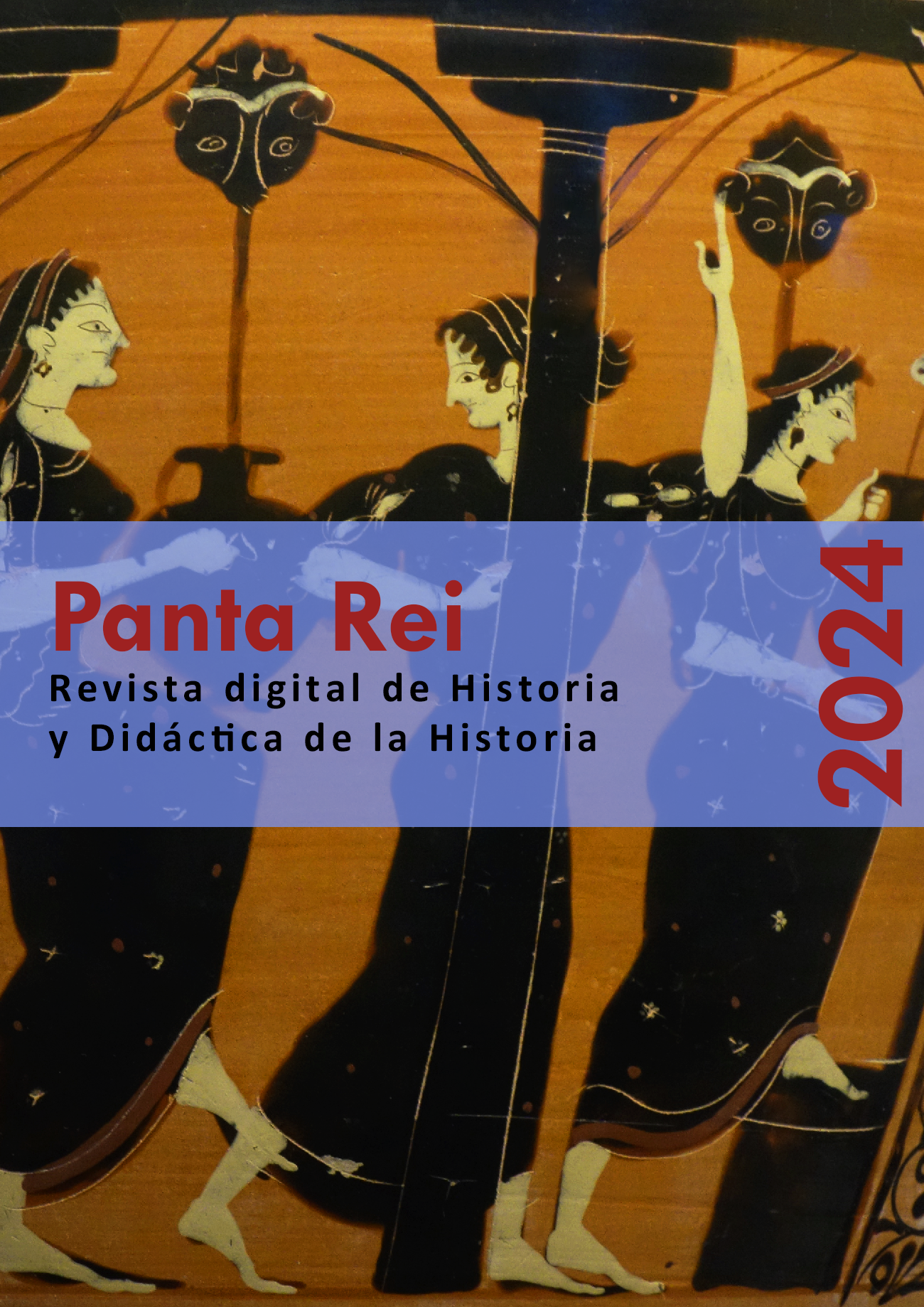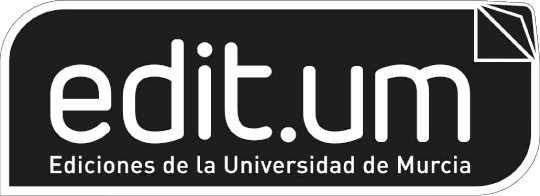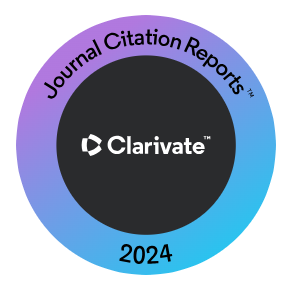Pensamiento histórico y crítico en el contexto educativo: una revisión sistemática
Resumen
Esta revisión sistemática analiza investigaciones de los últimos 5 años sobre el desarrollo del pensamiento histórico y crítico en la enseñanza de la historia. Siguiendo las directrices PRISMA, se seleccionaron 43 artículos empíricos de bases de datos como ScienceDirect, Web of Science, Scopus y Education Source. El análisis incluyó la sistematización de datos y la elaboración de una nube de palabras. Los resultados muestran que, aunque el pensamiento histórico y crítico presentan definiciones diferentes, comparten algunas habilidades intelectuales y de pensamiento que, al trabajar en sinergia, favorecen la evaluación de evidencias, el análisis de perspectivas, el razonamiento y la conexión con la realidad actual. En relación a las prácticas de enseñanza, aparecen habilidades de lectura, escritura, metodologías activas, salidas de campo y tecnología. La interpretación de los resultados nos sugiere que hemos de ayudar al alumnado a construir conciencia ciudadana crítica y conciencia histórica, para promover la comprensión de la historia y su relevancia en la vida presente y futura.
Descargas
-
Resumen4595
-
PDF1019
-
EPUB73
Citas
Acuña, O. Y. (2020). La historia en la escuela: dinámicas, retos y procesos. En J. Guerrero y O. Acuña (comp), La Historia vuelve a la Escuela. Reflexiones sobre la enseñanza de la Historia en Colombia (pp. 47-67). Universidad Pedagógica y Tecnológica de Colombia. https://repositorio.uptc.edu.co/items/20b93454-1836-4fe3-8aa7-0f1149a22f37
Aktin, K. (2019). Historical Imagination Skills of Preschool Children as Reflected in Their Clay Works. International Online Journal of Educational Sciences, 11(2), 87-104. https://doi.org/10.15345/iojes.2019.03.007
Anguera, C. y Santisteban, A. (2016). Images of The Future: Perspectives of Students from Barcelona. Journal of Futures Studies, September, 21(1), 1–18. https://jfsdigital.org/2016/11/13/images-of-the-future-perspectives-of-students-from-barcelona/
Ayers, C. A. (2018). A first step toward a practice-based theory of pedagogical content knowledge in secondary economics. Journal of Social Studies Research, 42(1), 61-79. https://doi.org/10.1016/j.jssr.2017.01.003
Ayers, C. A. (2019). Teaching students to “think like economists” as democratic citizenship preparation. Journal of Social Studies Research, 43(4), 405-419. https://doi.org/10.1016/j.jssr.2018.10.002
Bickford, J. H., Clabough, J. y Taylor, T. (2020). Fourth graders’ (Re-)Reading, (historical) thinking, and (revised) writing about the black freedom movement. Journal of Social Studies Research, 44(2), 249-261. https://doi.org/10.1016/j.jssr.2020.01.001
Blevins, B., Magill, K. y Salinas, C. (2020). Critical historical inquiry: The intersection of ideological clarity and pedagogical content knowledge. Journal of Social Studies Research, 44(1), 35-50. https://doi.org/10.1016/j.jssr.2019.09.003
Branscombe, A., Chandler, P. T. y Little, S. L. (2017). Students drum life stories: The role of cultural universals in project work. Journal of Social Studies Research, 41(1), 53-62. https://doi.org/10.1016/j.jssr.2015.10.004
Comisión Asesora para la Enseñanza de la Historia de Colombia, CAEHC. (2022). La enseñanza de la historia de Colombia. Ajustes posibles y urgentes para la consolidación de una ciudadanía activa, democrática y en paz. https://fecode.edu.co/images/PDF2022/Recomendacionesdise%C3%B1oyactualizacionLineamientoscurricularesCienciasSociales.pdf
Chaparro Sainz, Á., Felices de la Fuente, M.ª M. y Triviño Cabrera, L. (2020). La investigación en pensamiento histórico. Un estudio a través de las tesis doctorales de Ciencias Sociales (1995-2020). Panta Rei: revista digital de Historia y didáctica de la Historia, 93-147. https://doi.org/10.6018/pantarei.445541
Cho, H. (2018). Crafting a third space: Integrative strategies for implementing critical citizenship education in a standards-based classroom. Journal of Social Studies Research, 42(3), 273-285. https://doi.org/10.1016/j.jssr.2017.07.001
Cinnamon, S. A., Rivera, M. O. y Dial Sellers, H. K. (2021). Teaching disciplinary literacy through historical inquiry: Training teachers in disciplinary literacy and historical inquiry instructional practices. Journal of Social Studies Research. https://doi.org/10.1016/j.jssr.2021.03.001
Culkin, K. (2016). Doing Historian Business: Local History, Student Historians, and the Hall of Fame for Great Americans. Transformations, 26(2), 246-255. https://doi.org/10.5325/trajincschped.26.2.0246
De Lucia Castillo, F. y Saibel Santos, C. A. (2016). Nubes de palabras animadas para la visualización de información textual de Publicaciones Académicas. VIII Congreso Internacional de Computación y Telecomunicaciones. http://repositorio.uigv.edu.pe/handle/20.500.11818/615
Demircioğluy, E. y Kantekin, S. (2019). Tarih Pedagoji Programı Öğrencilerinin Tarih Kavramına İlişkin İnançlarının Metafor Analizi Yoluyla İncelenmesi / Examination of History Pedagogy Programme Students’ Beliefs about The Concept of History Through Metaphor Analysis. Journal of History Culture and Art Research, 8(1), 332. https://doi.org/10.7596/taksad.v8i1.1790
Ellis, D. L. y Vincent, M. A. (2020). How Well Do Structured Controversy Debates--and a Dash of" Fake History"--Promote Historical Thinking? History Teacher, 53(2). https://www.jstor.org/stable/27058579
Epstein, T. y Salinas, C. (2018). Research Methodologies in History Education. En S. A. Metzger y L. M. Harris (eds.), The Wiley International Handbook of History Teaching and Learning (pp. 61-92). New York: Wiley-Blackwell. https://doi.org/10.1002/9781119100812.ch3
Ernst, D., Esche, C. y Erbslöh, U. (2016). The art museum as lab to re-calibrate values towards sustainable development. Journal of Cleaner Production, 135, 1446-1460. https://doi.org/10.1016/j.jclepro.2016.06.196
Facione, P. A. (1990). Critical thinking: a statement of expert consensus for purposes of educational assessment and instruction. Millbrae: The California Academic Press. https://philarchive.org/archive/faccta
Fitchett, P. G. y Heafner, T. L. (2017). Student demographics and teacher characteristics as predictors of elementary-age students’ history knowledge: Implications for teacher education and practice. Teaching and Teacher Education, 67, 79-92. https://doi.org/10.1016/j.tate.2017.05.012
Ghosn-Chelala, M. (2020). Global citizenship education in conflict-affected settings: Implications of teachers’ views and contextual challenges for the Lebanese case. Teaching and Teacher Education, 93. https://doi.org/10.1016/j.tate.2020.103078
Gómez-Carrasco, C. J., López-Facal, R. y Rodríguez-Medina, J. (2019). La investigación en Didáctica de las Ciencias Sociales en revistas españolas de Ciencias de la Educación. Un análisis bibliométrico (2007‐2017). Revista de Didáctica de las Ciencias Experimentales y Sociales, 37, 67‐88. https://doi.org/10.7203/DCES.37.14440
González, J. M. (2020). La enseñanza de la historia hoy. Retos y posibilidades para la Colombia del “pos-acuerdo”. En J. Guerrero y O. Acuña (comp), La Historia vuelve a la Escuela. Reflexiones sobre la enseñanza de la Historia en Colombia (pp. 159-186). Universidad Pedagógica y Tecnológica de Colombia. https://repositorio.uptc.edu.co/items/20b93454-1836-4fe3-8aa7-0f1149a22f37
Gutiérrez, P. (2017). Strategies for Teaching and Dissemination of Artistic Heritage by Promoting Critical and Creative Thinking Among Future Primary Education Teachers. Procedia - Social and Behavioral Sciences, 237(June 2016), 717-722. https://doi.org/10.1016/j.sbspro.2017.02.112
Heafner, T. L. y Norwood, J. (2019). An elementary social studies teacher׳s quest to develop democratic citizens: The boundaries of ambitious teaching. Journal of Social Studies Research, 43(3), 187-198. https://doi.org/10.1016/j.jssr.2018.07.001
Hervás, R. y Miralles, P. (2004). Nuevas formas de enseñar a pensar: el pensamiento crítico a través de la enseñanza de la geografía y la historia. Íber. Didáctica de las Ciencias Sociales, Geografía e Historia, 42, 89-99. https://redined.educacion.gob.es/xmlui/handle/11162/85387
Hong, Q. N., Pluye, P., Fàbregues, S., Bartlett, G., Boardman, F., Cargo, M., Dagenais, P., Gagnon, M. P., Griffiths, F., Nicolau, B., O’Cathain, A., Rousseau, M. C. y Vedel, I. (2019). Improving the content validity of the mixed methods appraisal tool: a modified e-Delphi study. Journal of Clinical Epidemiology, 111, 49-59.e. https://doi.org/10.1016/j.jclinepi.2019.03.008
Hubbard, J. y Swain, H. H. (2017). Using the U.S. Civil Rights Movement to explore social justice education with K-6 pre-service teachers. Journal of Social Studies Research, 41(3), 217-233. https://doi.org/10.1016/j.jssr.2016.09.002
Ibagón, N. (2018). Alfabetización histórica y pensamiento histórico. Apuntes para pensar la enseñanza-aprendizaje de la historia en la escuela. Revista Educación y Cultura, 128, 69-73. https://www.researchgate.net/publication/330337274
Kaviza, M. (2019). Hubungan antara Amalan dan Penguasaan Kemahiran Pemikiran Sejarah. Jurnal Pendidikan Malaysia, 44(1), 29-36. http://dx.doi.org/10.17576/JPEN-2019-44.01-04
Keleşzade, G., Güneyli, A. y Özkul, A. E. (2018). Effectiveness of history teaching based on social constructivist learning and development of historical thinking skills. Egitim ve Bilim, 43(195), 167-191. https://doi.org/10.15390/EB.2018.7479
Kiili, C. y Leu, D. J. (2019). Exploring the collaborative synthesis of information during online reading. Computers in Human Behavior, 95(January), 146-157. https://doi.org/10.1016/j.chb.2019.01.033
Kissel, B., Miller, E., Byker, E., Good, A. y Fitchett, P. (2019). Museums as mentor texts: Preservice teachers analyze informational text structures and features present in a historical museum. Journal of Social Studies Research, 43(4), 343-360. https://doi.org/10.1016/j.jssr.2019.01.001
Knoos, M., Glaser, M. y Schwan, S. (2021). Multiple documents of text and picture: Naming a historical painting’s inaccuracies influences conflict regulation strategies. Contemporary Educational Psychology, 65, 101970. https://doi.org/10.1016/j.cedpsych.2021.101970
Lara, C. A., Navarro-Roldán, C. P., Castellanos-Páez, V. y Reyes-Parra, P. A. (2020) Cambio conceptual durante los procesos de interacción en el aula: análisis del aprendizaje de la violencia entre 1946 y 1958. En C. P. Navarro-Roldán (Comp.), Desarrollo del Pensamiento Histórico en la Escuela (pp. 79-118). Editorial UPTC https://acortar.link/x7bGbm
Lévesque, S. y Clark, P. (2018). Historical thinking: Definitions and educational applications. En S. A. Metzger y L. M. Harris (Eds.) The Wiley international handbook of history teaching and learning (pp. 119-148). Wiley-Blackwell. https://doi.org/10.1002/9781119100812.ch5
Lialikhova, D. (2019). “We can do it together!” – But can they? How Norwegian ninth graders co-constructed content and language knowledge through peer interaction in CLIL. Linguistics and Education, 54. https://doi.org/10.1016/j.linged.2019.100764
Luís, R. y Rapanta, C. (2020). Towards (re-) defining historical reasoning competence: A review of theoretical and empirical research. Educational Research Review, 31, 100336. https://doi.org/10.1016/j.edurev.2020.100336
Madariaga, P. y Schaffernicht, M. (2013). Uso de objetos de aprendizaje para el desarrollo del pensamiento crítico. Revista de Ciencias Sociales (Ve), XIX(3), 472-484. https://www.redalyc.org/pdf/280/28028572010.pdf
McLaughlin, A. C. y McGill, A. E. (2017). Explicitly Teaching Critical Thinking Skills in a History Course. Science and Education, 26(1-2), 93-105. https://doi.org/10.1007/s11191-017-9878-2
Mejía, L. y Mejía, Á. M. (2015). Relaciones entre pensamiento histórico y pensamiento crítico en la enseñanza de las ciencias sociales en estudiantes de educación básica secundaria. Revista Interamericana de Investigación Educación y Pedagogía RIIEP, 8(2). https://doi.org/10.15332/s1657-107X.2015.0002.10
Minte, A. R. y Ibagón, N. J. (2017). Pensamiento crítico: ¿competencia olvidada en la enseñanza de la historia? Entramado, 13(2), 186-198. https://doi.org/10.18041/entramado.2017v13n2.26228
Monroy, C. L. (2020). La enseñanza de la historia en educación básica y media: su aproximación a la historia local. En J. Guerrero y O. Acuña (comp), La Historia vuelve a la Escuela. Reflexiones sobre la enseñanza de la Historia en Colombia (pp. 187-204). Universidad Pedagógica y Tecnológica de Colombia. https://repositorio.uptc.edu.co/items/20b93454-1836-4fe3-8aa7-0f1149a22f37
Monte-Sano, C. (2011). Learning to open up history for students: Preservice teachers' emerging pedagogical content knowledge. Journal of Teacher Education, 62, 260-272. https://doi.org/10.1177/0022487110397842
Moorhead, L. y Jimenez, J. (2021). ‘This is me’: Expressions of intersecting identity in an LGBTQ+ ethnic studies course. Journal of Social Studies Research, 45(1), 35-57. https://doi.org/10.1016/j.jssr.2020.04.003
Moreno-Vera, J. R. (2018). El pensamiento crítico en la enseñanza de la historia a través de temas controvertidos. Actualidades Pedagógicas, 1(72), 15-28. https://doi.org/10.19052/ap.5215
Mtawa, N. N., Fongwa, S. N. y Wangenge-Ouma, G. (2016). The scholarship of university-community engagement: Interrogating Boyer’s model. International Journal of Educational Development, 49, 126-133. https://doi.org/10.1016/j.ijedudev.2016.01.007
Myskow, G. (2019). Calibrating the ‘right values’: the role of critical inquiry tasks in social studies textbooks. Visual Communication, 18(1), 31-54. https://doi.org/10.1177/1470357218778876
Navarro-Roldán, C. P. (2022). Las preguntas como estrategia de andamio en la enseñanza (Vol. 258). Editorial Universidad Pedagógica y Tecnológica de Colombia. Tunja https://doi.org/10.19053/9789586606967
Navarro-Roldán, C. P. y Reyes-Parra, P. A. (2016). Cambios cognitivos en la forma de explicar la historia en estudiantes de quinto grado. Pensamiento Psicológico, 14(2), 63-75. https://doi.org/10.11144/Javerianacali.PPSI14-2.ccfe
Novis-Deutsch, N., Perkis, E. y Granot-Bein, Y. (2018). Six teaching orientations of Holocaust educators as reflections of teaching perspectives and meaning making processes. Teaching and Teacher Education, 71, 86-97. https://doi.org/10.1016/j.tate.2017.12.004
Nygren, T. (2016). Thinking and caring about indigenous peoples’ human rights: Swedish students writing history beyond scholarly debate. Journal of Peace Education, 13(2), 113-135. https://doi.org/10.1080/17400201.2015.1119106
Page, M. J., McKenzie, J. E., Bossuyt, P. M., Boutron, I., Hoffmann, T. C., Mulrow, C. D., Shamseer, L., Tetzlaff, J. M., Akl, E. A., Brennan, S. E., Chou, R., Glanville, J., Grimshaw, J. M., Hróbjartsson, A., Lalu, M. M., Li, T., Loder, E. W., Mayo-Wilson, E., McDonald, S., … Moher, D. (2021). The PRISMA 2020 statement: An updated guideline for reporting systematic reviews. BMJ, 71. https://doi.org/10.1136/bmj.n71
Palacios, N. (2019). Teaching violence, drug trafficking and armed conflict in colombian schools: Are history textbooks deficient? Issues in Educational Research, 29(3), 899-922. https://eric.ed.gov/?id=EJ1222694
Paul, R. y Elder, L. (2008). The miniature guide to critical thinking concepts and tools. Tomales, CA: Foundation for Critical Thinking Press Retrieved from Foundation for Critical Thinking. http://www.criticalthinking.org/pages/defining-critical-thinking/766/
Perrotta, K. (2020). Getting HIP: A study on the implementation of asynchronous discussion boards as a high-impact practice in online undergraduate survey history courses. Journal of Social Studies Research, 44(2), 209-217. https://doi.org/10.1016/j.jssr.2020.02.001
Perrotta, K. A. y Feinberg, J. R. (2016). Using Digital Simulations for Teaching the Constitutional Convention in Undergraduate History. Social Studies Research & Practice, 11(1), 158-175. http://jproxy.lib.ecu.edu/login?url=http://search.ebscohost.com/login.aspx?direct=true&db=ehh&AN=114822660&site=ehost-live
Plá, S. (2008). Metamorfosis del discurso histórico escolar: de la historia a la psicología en la reforma educativa de 1993 en México. Revista de Teoría y Didáctica de las Ciencias Sociales, 13, 171-194. https://www.redalyc.org/pdf/652/65216719009.pdf
Reisman, A. (2012). Reading like a historian: A document-based history curriculum intervention in urban high schools. Cognition and Instruction, 30(1), 86-112. https://doi.org/10.1080/07370008.2011.634081
Reisman, A. y Fogo, B. (2016). Contributions of educative document-based curricular materials to quality of historical instruction. Teaching and Teacher Education, 59, 191-202. https://doi.org/10.1016/j.tate.2016.05.018
Restrepo, J. D. (2018). Reflexiones en torno a la enseñanza de la Historia en Colombia: un breve balance historiográfico. Revista Ciencias Sociales 161, 91-102. https://www.revistacienciassociales.ucr.ac.cr/html/06-RESTREPO/06-RESTREPO.html
Sánchez-Martín, M., Navarro-Mateu, F. y Sánchez-Meca, J. (2022). Las Revisiones Sistemáticas y la Educación Basada en Evidencias ECP. Espiral. Cuadernos del Profesorado, 15(30), 108-120. https://doi.org/10.25115/ecp.v15i30.7860
Santiago, J. A. (2016). La acción didáctica de las Ciencias Sociales y el desarrollo del pensamiento crítico. Educación y Humanismo, 18(31), 241-256. http://revistas.unisimon.edu.co/index.php/educacion/article/view/2361
Santisteban, A. (2017). Del tiempo histórico a la conciencia histórica: cambios en la enseñanza y el aprendizaje de la historia en los últimos 25 años. Diálogo Andino, 53, 87-99. http://dx.doi.org/10.4067/S0719-26812017000200087
Santisteban, A. y Castellví, J. (2021). La formación del Pensamiento Histórico como Pensamiento Crítico. En A. Santisteban y C. A. Lima-Ferreira (orgs.). O ensino de história no Brasil e Espanha. uma homenagem a Joan Pagès Blanch (pp.47-68). Porto Alegre, RS: Editora Fi. https://www.editorafi.com/132ensino
Santisteban, A., Gomes, A. y Sant, E. (2021). El currículum de historia en Inglaterra, Portugal y España: contextos diferentes y problemas comunes. Educar em Revista, 37, 1-24. http://dx.doi.org/10.1590/0104-4060.77050
Santisteban, A., González-Valencia, G. y Sant, E. (2022). Educación para el Futuro: Prospectiva para la sostenibilidad y la justicia social. Comunicar 30(73), 1- 4. https://www.revistacomunicar.com/pdf/73/presentacion-es.pdf
Seixas, P. (1999). Beyond “content” and “pedagogy”: In search of a way to talk about history education. Higher Education, 31(3), 317-337. https://doi.org/10.1080/002202799183151
Seixas, P. (2015). A model of historical thinking. Educational philosophy and theory, 49(6), 593-605. https://doi.org/10.1080/00131857.2015.1101363
Seixas, P. y Peck, C. (2004). Teaching historical thinking. En A. Sears & I. Wright. (Eds.), Challenges and Prospects for Canadian Social Studies (pp. 109-117). Vancouver: Pacific Educational Press. https://www.dedhammuseum.org/wp-content/uploads/2022/12/Teaching-Historical-Thinking.pdf
Seixas, P. y Morton, T. (2012). The big six historical thinking concepts. Toronto, Canadá: Nelson. https://bibliotecadigital.mineduc.cl/handle/20.500.12365/17630
Smith, M., Breakstone, J. y Wineburg, S. (2019). History assessments of thinking: A validity study. Cognition and Instruction, 37(1), 118–144. https://doi.org/10.1080/07370008.2018.1499646
Stoel, G., Logtenberg, A., Wansink, B., Huijgen, T., van Boxtel, C. y van Drie, J. (2017). Measuring epistemological beliefs in history education: An exploration of naïve and nuanced beliefs. International Journal of Educational Research, 83, 120-134. https://doi.org/10.1016/j.ijer.2017.03.003
Swalwell, K. y Sinclair, K. (2021). The appeal of a controversial text: Who uses a People’s history of the United States in the U.S. history classroom and why. Journal of Social Studies Research, 45(2), 84-100. https://doi.org/10.1016/j.jssr.2020.08.003
Thorp, R. y Persson, A. (2020). On historical thinking and the history educational challenge. Educational Philosophy and Theory, 52(8), 891-901. https://doi.org/10.1080/00131857.2020.1712550
Van Drie, J. y van Boxtel, C. (2008). Historical reasoning: Towards a framework for analyzing students' reasoning about the past. Educational Psychology Review, 20(2), 87-110. https://link.springer.com/article/10.1007/s10648-007-9056-1
Vásquez Leyton, G. (2016). Las bases curriculares 2013: los desafíos actuales para la formación inicial y aprendizaje histórico de profesores de historia en Chile. Educar em Revista, 60, 147-160. https://doi.org/10.1590/0104-4060.46005
Veijola, A. y Mikkonen, S. (2016). Historical literacy and contradictory evidence in a Finnish high school setting: The Bronze Soldier of Tallinn. Historical Encounters, 3(1), 1-16. http://hej.hermes-history.net/index.php/HEJ/article/view/52
Voet, M. y De Wever, B. (2017). Preparing pre-service history teachers for organizing inquiry-based learning: The effects of an introductory training program. Teaching and Teacher Education, 63, 206-217. https://doi.org/10.1016/j.tate.2016.12.019
Wiley, J., Griffin, T. D., Steffens, B. y Anne Britt, M. (2020). Epistemic beliefs about the value of integrating information across multiple documents in history. Learning and Instruction, 65. https://doi.org/10.1016/j.learninstruc.2019.101266
Wineburg, S. (1991). Historical problem solving: A study of the cognitive processes used in the evaluation of documentary and pictorial evidence. Journal of educational Psychology, 83(1), 73. https://doi.org/10.1037/0022-0663.83.1.73
Wineburg, S., Smith, M. y Breakstone, J. (2018). What is learned in College history classes? Journal of American History, 104(4), 983-993. https://doi.org/10.1093/jahist/jax434
Xie, B. (2020). Construction of Teacher Culture in Applied Colleges under the Background of Educational Informationization. Microprocessors and Microsystems. https://doi.org/10.1016/j.micpro.2020.103486
Derechos de autor 2024 Paola Andrea Reyes Parra, Claudia Patricia Navarro Roldán , Antoni Santisteban Fernández

Esta obra está bajo una licencia internacional Creative Commons Atribución-CompartirIgual 4.0.
Todos los contenidos publicados en nuestra revista están sujetos a una licencia Atribución 4.0 Internacional (CC BY-SA 4.0) de Creative Commons. Usted es libre de compartir (copiar y redistribuir el material en cualquier medio o formato) y adaptar (remezclar, transformar y crear a partir del material para cualquier finalidad, incluso comercial), bajo los siguientes términos:
Reconocimiento: Debe reconocer adecuadamente la autoría, proporcionar un enlace a la licencia e indicar si se han realizado cambios. Puede hacerlo de cualquier manera razonable, pero no de una manera que sugiera que tiene el apoyo del licenciador o lo recibe por el uso que hace.
CompartirIgual: Si remezcla, transforma o crea a partir del material, deberá difundir sus contribuciones bajo la misma licencia que el original.
El texto completo de la licencia se puede consultar en: Licencia Creative Commons












